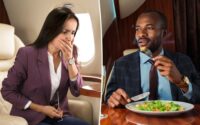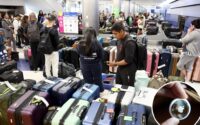The Bahamas is paying for private jets for COVID tourists
For Raquel Pires, flying on a private Learjet was always a fantasy. She just never thought she would have to contract COVID-19 to do it.
The 25-year-old from Cranford, NJ, couldn’t wait to hit the sun and sand with her best friend in the Bahamas earlier this month. After they both received negative PCR tests, they hopped a plane to the five-star SLS Baha Mar resort for five days of fun.
It was all beachy good times — sipping piña coladas and swimming with sea turtles — until the insurance broker went to get another COVID test in anticipation of flying home.
“An hour later I got a phone call on my cell,” she recalled. “Someone from the hotel said, ‘You have to go to your room right now, you tested positive.’ “

She returned to her $1,000-a-night suite in a haze to gather her belongings before she was quickly whisked off to the hotel’s less-luxe COVID-19 bottom floor, where a worker in a hazmat suit was sweeping the hallway. The resort laid out her limited options. She could either stay in the Bahamas for 14 days or until she tested negative on her own dime (roughly $140 a night). Or, because of her underlying Type 1 diabetes, the Bahamian government would pay for her to be flown out the next day on a private medical jet operated by Covac Global, a relatively new company with a fleet of jets and helicopters that have been converted to flying intensive care units for VIPs (Very Infected Persons).
“It was kind of cool, even if it wasn’t an ideal situation,” Pires said.


The CDC has issued a travel advisory advising Americans to avoid travel to the Bahamas, where coronavirus cases spiked in August, with 223 cases per 100,000 people reported in the last seven days.
And so business is booming for Covac Global and its competitors, thanks to current US regulations requiring that citizens test negative three days before returning to the country. If they test positive, the only way they can travel back to the US is in a certified air ambulance with medical personnel. Covac, which is unique in that passengers don’t have to be hospitalized prior to flying, has seen membership increase by 500 percent this year; the 30-year-old Medjet reports that it has seen more business this past summer than ever before.
“It seems like everyday we’re rescuing someone from around the world,” said Covac Global CEO Ross Thompson, 35, a Manhattan native who founded the company in the spring of 2020 anticipating a need for its services. “The vaccinated are getting sick. It’s happening so much, I can’t even tell you.”


Most passengers pay their own way. Some buy memberships, paying $2,400 annually for services, if needed. But the vast majority pay a la carte, and costs can easily creep into the six figures. If Pires had needed to cover her own expenses, it would have cost her roughly $45,000 for a relatively short flight home.
“People can pay $200,000 out of pocket,” said Thompson, recalling a couple who were recently vacationing in Dubai when a surprise positive test surfaced and the duo forked over $220,000 to get home to Los Angeles on a Dassault Falcon 50 jet.
Naturally, with such a price tag, some passengers expect more than just a safe ride home.
“We definitely have requests for sparkling water and Perrier,” Thompson said. “But most people are just grateful.”


